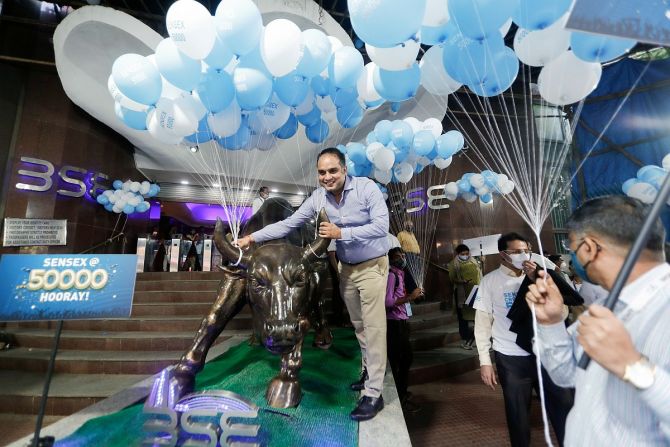 | « Back to article | Print this article |
Market participants are hoping for a few tweaks on the taxation front which will encourage consumers and businesses to spend.
If the Sensex has to climb further from current levels, the performance of the financial sector will be the key.
Ashley Coutinho reports.

The benchmark BSE Sensex hit the 50,000 mark on January 21, having gained more than 90 per cent from the lows in March last year and adding about 5,000 points in just 32 trading sessions.
The rally has been aided by benign global liquidity, robust FPI flows, faster than anticipated recovery in economic activity, and expectations of a big-bang Budget.
Business Standard looks at five key factors that market players believe could have a bearing on the market movement in the near term:
US stimulus
US President Joe Biden outlined a $1.9 trillion stimulus package a few days back with an aim to jump-start the economy and accelerate the distribution of vaccines in order to bring the pandemic under control.
Stocks have rallied on hopes that the relief measures could continue to provide support for assets worldwide, including emerging market equities.
Foreign portfolio investors (FPIs) offloaded stocks worth over $8.4 billion in March and April.
They were net buyers in seven of the remaining eight months of CY20, with total purchases worth Rs 2.2 trillion, including record buying of Rs 70,900 crore in November.
Analysts expect flows of $10-15 billion from emerging markets coming to India this year.
January has already seen inflows of $3 billion so far.
Budget boost
Finance Minister Nirmala Sitharaman has promised a "never before" Union Budget that will help steer the pandemic-battered economy.
The government may focus on infrastructure in a bid to help kick-start the economy and lower unemployment.
Policies that can help to improve private participation and encourage investments in various sectors will be keenly watched.
Market participants are hoping for a few tweaks on the taxation front which will encourage consumers and businesses to spend.
Exemption on tax on long-term capital gains arising on sale of listed equity shares or reduction in the quantum of securities transaction tax are also on the wish list.
“Despite what the FM has said, there’s not too much of a build-up ahead of the Budget this year.
"There’s not much scope to boost spending given the current fiscal situation.
"There might be a cut in personal taxation to encourage consumers to start spending, or some sort of deduction which consumers and businesses can use on spending,” added Deepak Jasani, head of retail research, HDFC Securities.
“We expect the focus of spending to be on healthcare, housing and infrastructure.
"Real estate revival is already underway and the government can design targeted incentives to revive real estate capex.
"Production linked incentive scheme has seen early success and further momentum can be imparted if it can be backed up by dedicated export zones with associated infrastructure and easier approvals.
"More emphasis on devising alternate funding mechanism for infrastructure investments is expected,” said Rahul Singh, CIO-equities, Tata Mutual Fund.
Valuations
Some analysts reckon that the underlying corporate and economic fundamentals have not kept pace with the surge in stock valuation on the bourses in the past few months.
The BSE Sensex is currently trading at a trailing 12-month P/E multiple of around 33 times — the highest in the last 25 years.
As of now, the market is factoring a base case scenario with a V-shaped recovery for the economy and sharp pick-up in earnings growth.
Since valuations remain stretched, a lot will hinge on how the pandemic scenario plays out and the liquidity stance taken by central banks.
Any negative news flows on these fronts could trigger a correction, said experts.
“Given stretched valuations, consolidation or some correction is not ruled out in coming weeks, however we advise investors to use this opportunity to invest as the medium-term outlook for equities is still positive.
"We prefer industrials, capital goods companies and large private banks,” said Jitendra Gohil, head India equity research, Credit Suisse Wealth Management, India.
Earnings growth
Earnings momentum has gathered further pace in Q3 FY2021, led by festive and pent-up demand.
Lower employee expenditure and lower raw material costs also helped boost margins in the last two quarters, something analysts don’t expect this to continue because of higher commodity prices and advertising spends.
However, a faster-than-expected recovery in GDP and a lower-than-expected drag from the fiscal side could have a positive impact on earnings, which are showing good resilience, according to experts.
By and large, market participants expect an earnings growth rate of 25 per cent for FY22 and 15-20 per cent the year after.
“So far five out of 50 Nifty companies have reported earnings and all have beaten expectations considerably, leading to a further upward revision of earnings estimates.
"The consensus Nifty EPS for FY2021 and FY2022 saw a revision of 8.9 per cent and 6 per cent in the past three months, respectively,” said Gohil.
Financial stocks
Financial stocks, including banks, are the biggest weight in the index.
If the Sensex has to climb further from current levels, the performance of this sector will be the key.
For now, the Street has turned bullish on the space given the better than expected September quarter results, creation of capital buffers and lower than expected bad loans.
Banks, which were one of the worst impacted post pandemic, have seen lower NPA stress than anticipated. However, the full picture on NPAs may emerge only in the next quarter.
“Provisioning remains a big question mark.
"The moratorium effect was over by November and the Supreme Court restraint on identifying NPAs may get over in the coming weeks.
"Once that happens we will come to know the exact damage to the asset quality,” said Jasani.